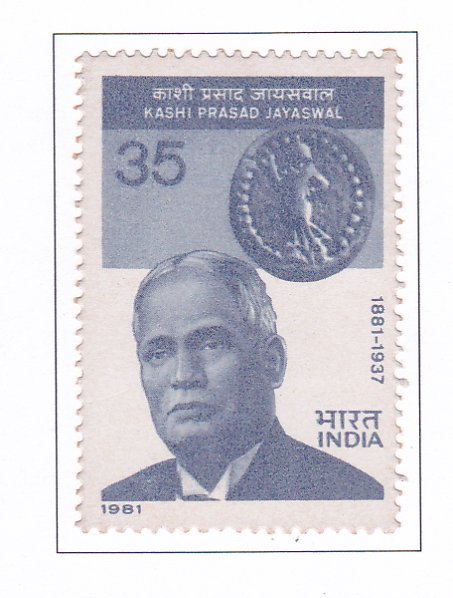Birth Centenary of Kashi Prasad Jayasawal (1881-1937)

Technical Data
| Stamp Set | Birth Centenary |
|---|---|
| Date of Issue | November 27, 1981 |
| Denomination | 35 p |
| Quantity | 2,000,000 |
| Perforation | comb 14 x 14½ |
| Printer | Security Printing Press, Nashik |
| Watermark | No Watermark |
| Colors | Blue |
| Catalog Codes |
Michel IN 890 Stamp Number IN 944 Yvert et Tellier IN 691 Stanley Gibbons IN 1027 |
| Themes | Anniversaries and Jubilees | Coins | Famous people | Historians | Lawyers-Advocates | Men |
Kashi Prasad Jayasawal, born on November 27, 1881, in Mirzapur (U.P), was a luminary in the fields of law, history, and numismatics. After completing his post-graduation at Allahabad University, he pursued further studies at Oxford University, where he excelled and was awarded the Davis Chinese Scholarship in 1909. He was called to the Bar of the Lincoln’s Inn, London, after obtaining a distinguished degree of M.A. in Ancient Indian History.
Upon his return to India, Jayaswal practiced law at the Calcutta High Court. However, it was his encounter with Sir Ashutosh Mookherjee, the Vice-Chancellor of Calcutta University, that ignited his passion for historical research. Encouraged by Mookherjee, Jayaswal delved into extensive research in Ancient Indian History, which soon became his primary focus over legal practice.
Jayaswal gained prominence with his groundbreaking articles on “Hindu Polity,” published in the “Modern Review” in 1913, which offered fresh insights into ancient Indian history. His Tagore Law Lectures at Calcutta University, focusing on Hindu Law according to Manu and Yajnavalkya, were widely acclaimed.
His monumental work, “History of India-150 AD to 350 AD,” further solidified his reputation as a historian. Despite his legal career, Jayaswal’s dedication to historical research remained steadfast. He shifted his legal practice to Patna after the establishment of a High Court in Bihar in 1916 but continued his scholarly pursuits.
Jayaswal’s contributions extended beyond academia. He actively participated in excavating, restoring, and preserving ancient relics of India’s cultural heritage. Many of these artifacts are housed in the Patna Museum today. Additionally, his expertise in numismatics and deciphering ancient scripts, including the “Hathi-Gumpha” inscription of Emperor Kher Vela, earned him international recognition.
Jayaswal’s accomplishments were widely acknowledged, and he received honorary degrees from prestigious institutions like Benares Hindu University and Patna University. He served as the president of the Numismatic Society of India and the All India Oriental Conference, further highlighting his eminence in scholarly circles.
His legacy continues to inspire generations, and the Indian Post & Telegraphs Department is honored to issue a stamp in his honor, commemorating his invaluable contributions to Indian history and culture.
